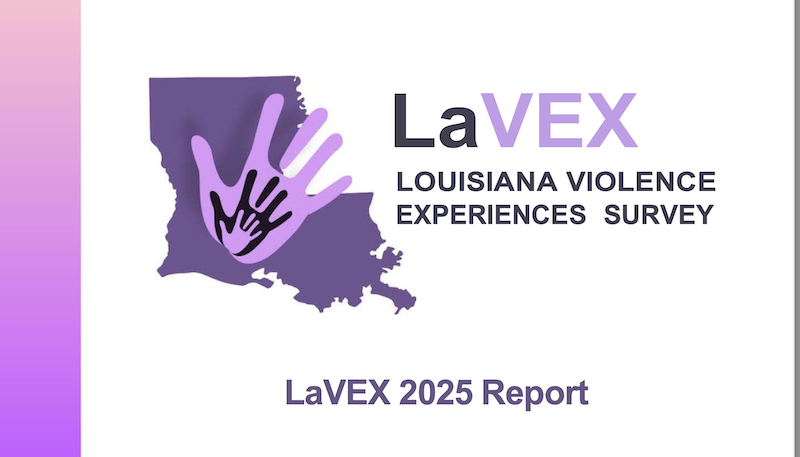Tulane study finds Louisiana violence declining but still widespread: More than half of adults affected in their lifetime
A new statewide survey led by Tulane University's Newcomb Institute shows that while rates of sexual and physical violence in Louisiana have declined since 2023, violence remains widespread, affecting more than half of adults at some point in their lives and nearly one in 10 within the past year.
The Louisiana Study on Violence Experiences Across the Lifespan (LaVEX 2025) was conducted by researchers at Tulane in collaboration with the University of California San Diego and administered by the National Opinion Research Center at the University of Chicago. The survey captures how residents experience and are affected by different forms of violence, from harassment to weapon-related assault.
LaVEX is the only comprehensive, population-level survey on violence in Louisiana and one of the few such studies in the United States. The full 2025 report is available at https://www.vexdata.org/lavex-report-2025/.
The findings show that an estimated 1.9 million adults in Louisiana have experienced physical violence, 1.5 million have experienced sexual violence, including harassment, coercion and assault, and 1.8 million have experienced intimate partner violence in their lifetime.
In the past year alone, roughly 250,000 Louisianans experienced physical assault, and about 250,000 experienced sexual harassment or assault.
The 2025 results indicate modest declines in overall violence since the first LaVEX report in 2023. Physical violence has decreased slightly among men, and sexual violence has declined for both men and women, including reductions in sexual harassment, coercion and forced sex among women. However, rates of intimate partner violence are unchanged.
“Violence is both a health and an economic crisis for Louisiana,” said Anita Raj, executive director of the Newcomb Institute and lead researcher on the study. “These data show that progress is possible. We are seeing reductions in sexual and physical violence since 2023, but the scale of harm remains staggering. Violence is not only a personal tragedy; it’s a public problem that affects our families, workforce and communities. We cannot improve health and safety in our state without addressing the ubiquity of violence.”
Women continue to face higher risks of sexual and intimate partner violence, with nearly one in four women reporting forced sex in their lifetime and more than one in four saying a partner had burned, choked, or used a weapon against them. Men are more likely to experience physical violence and gun violence, with one in four men in Louisiana having experienced threats or gun violence.
Economic hardship sharply increases vulnerability. Adults who lacked money for food or basic needs in the past year were two to six times more likely to experience violence. Those who were evicted or had a history of homelessness faced similar or greater risks. Survivors also showed two to eight times higher likelihood of depression, anxiety or suicidal thoughts, underscoring the connection between violence and mental health.
“This data gives us what we’ve been missing in Louisiana: a real picture of how sexual violence shows up in people’s lives,” said Morgan Lamandre, president and CEO of Sexual Trauma Awareness and Response (STAR), a Louisiana nonprofit that supports survivors of sexual trauma and works to improve community response and prevention of sexual violence.
“It confirms what survivors and advocates have been saying for years: the problem is everywhere, but it’s not the same everywhere. The risks and realities look different depending on who you are and where you live. Now we have data that proves what experience has already taught us – that prevention, policy and services must be tailored to the realities of each community.”
The LaVEX 2025 survey was conducted in May and June among more than 1,000 Louisiana residents aged 18 and older. It was administered online in English and Spanish and reviewed by the Institutional Review Boards at the University of Chicago and UC San Diego.
The 2025 survey added new questions about gun and domestic violence restraining orders, juvenile incarceration and civic engagement, while continuing to assess physical, sexual and intimate partner violence.
Raj will share the results of the survey at the meeting of the state Domestic Violence Prevention Commission at the Louisiana State Capitol in Baton Rouge on Nov. 20.


